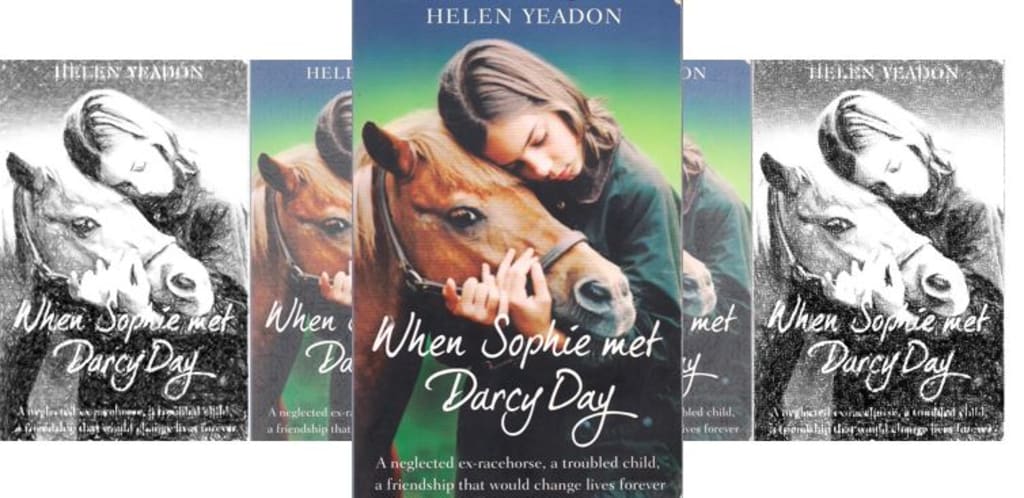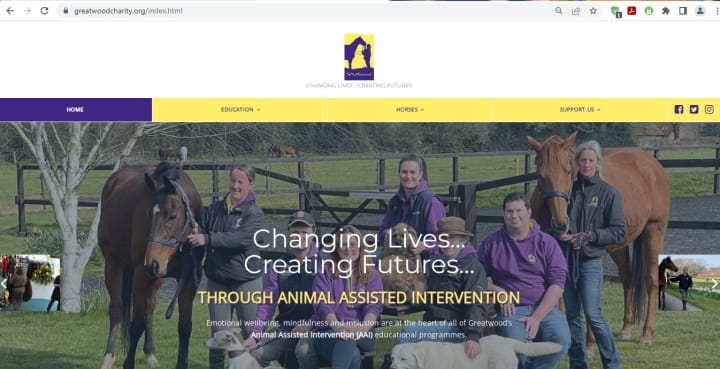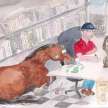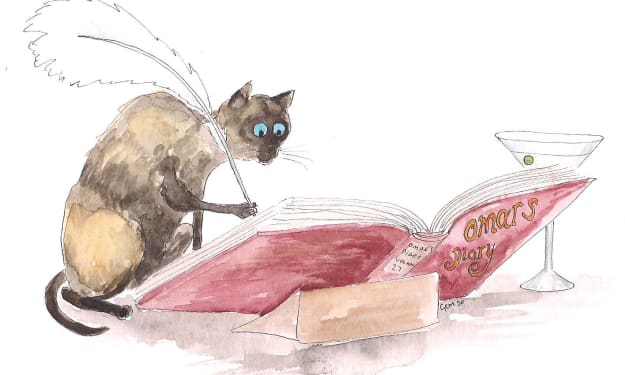When Sophie met Darcy Day by Helen Yeadon
Cracks in our society and how horses help fix them

This is the first book for a very long time that I have read cover to cover in just over a day for a very long time; all 302 pages. I think the last one I read this quickly was a Frederick Forsyth thriller.
“When Sophie Met Darcy Day” is not just a story of how a couple who had a vision and achieved it despite all the struggles they endured. It is a story of how when horses enter our lives, even briefly, how they can make an instant connection with us. It is a story that exposes some huge cracks in our society especially where children are concerned. It is a story that dispels some commonly held beliefs that retired racehorses are not suitable for any sort of life outside of racing.
Helen Yeadon, the author, has always had an affinity with horses since childhood when she grew up on a farm. She is particularly interested in racehorses, or “Thoroughbreds” as she calls them and their welfare after racing. Note the use of the uppercase “T”.
Her ambition began to be fulfilled on a small farm in Devon. That is to give horses a second chance at life. The need for what she and her husband, Michael, were doing grew and so they had to move their operation twice more. Now they are settled on a farm near Marlborough in Wiltshire in southern central England where the forever home for their work will be.
The charitable operation they founded is called “Greatwood” and has become famous throughout the British horse racing industry for the valuable work they do in rehabilitating Thoroughbreds. Retraining them, rehoming them whenever possible and if they cannot be rehomed then guaranteeing them a home for life at Greatwood. As well as giving horses that “second chance” Greatwood has become a centre of excellence with a strong reputation throughout the education system for giving young people with learning and physical issues or from appalling backgrounds a “first chance” with horses and other animals that could be life changing.
The title of the book came about when a horse named Darcy Day arrived at Greatwood in an extremely, depressed and decrepit state. After being vetted on arrival the vet kindly said the only thing in the mare’s favour was that she was not suffering from lice. Helen and Michael set about healing Darcy Day. A few days later a Saturday morning a young teenager named “Sophie” was left at the farm by her parents for a few hours. She had serious problems. Something had happened that stopped her from speaking or showing reactions of excitement, happiness or pleasure.
It was on Sophie’s first day that Helen and Michael got her to help them with Darcy Day. The three of them went to her stable. Almost immediately the horse came from the back of the box and offered her head to Sophie to be stroked and petted. In the author’s own words:
“Even though she (Darcy Day) must still have been feeling rotten with her legs and all her other health complaints, she was able to make a connection with this silent child”
Making a “connection” is the underlying theme of the story. Be it between the hardest of seemingly hard children from the worst of backgrounds. Or, a silent and gentle girl like Sophie. It is that empathetic connection between horses and people that can be life changing.
From that encounter came the idea of offering some sort of training at one day a week over eight to ten weeks for children who suffice to say, had issues. Each course is geared towards the children receiving a certificate of competence in horse related matters which was accredited by the education authorities. For many children achieving their certificates these were the first time in their lives they had been awarded anything as a result of their own efforts One huge success story was a young boy who passed his course at Greatwood and then went on to study and achieve at the local agricultural college. Something he and his teachers had never dreamed was possible that first day he stepped on to the yard at Greatwood.
It was some of the children’s back stories that made their achievements so heart-warming to the point of making my eyes well up a couple of times.
Helen pulled one young lad into a private room to try to establish the root cause of his behaviour. There was a plate of biscuits on the table and he grabbed as many as he could to eat rapidly. Helen told him that was not polite and then asked what he had eaten for breakfast that day. He had nothing and his next main meal was either going to be a MacDonald’s Happy Meal or fish and chips from a takeaway. His records showed he lived with his mother and four other siblings in extremely bad conditions. Despite all that damaging baggage he became a star pupil during the time he was there.
This book was written in 2011. Now in 2022 with economic circumstances getting worse by the day this sort of scenario for children falling into all levels of poverty is going to become increasingly common and saddening.
Outside of horse racing in the rest of the horse world, which we are part of, there is an inbred prejudice against taking Thoroughbreds who have raced. They are regarded as “mental”, “loopy”, “doolally”, “dangerous” and loads of other negative adjectives. Some of those adjectives are as far away from being politically correct as Sir Isaac Newton was from being able to make gold.
Repeatedly through the book the author cites Thoroughbreds that have arrived at Greatwood in all sorts of conditions having left racing and what marvellous, empathetic and loving beings they are. She writes how somehow a horse that is known for moving quickly in the stable will, once there is a small child or one with a difficulty how that horse will do everything it can to avoid hurting or frightening them.
From a personal point of view, we have four horses of varying ages. One day a friend of ours who has MS came up to see our veteran of thirty., Rainbow. We went into the field together to get her ready for a walk. Rainbow went past me and immediately nuzzled up against our friend. After we had been for a walk, we put Rainbow back in her field and had coffee. It was then that our friend told me that neuralgia is part of MS and how that morning she nearly cancelled her time with Rainbow because it was so bad. Yet, as soon as Rainbow nuzzled her in the field the neuralgia went away but as we were sitting together, she could feel it returning.
The rehab process at Greatwood allows the horses that arrive to get better from any ailments they have. Then they can be horses again by going out to graze, maybe for the first time for some. They are given the freedom to choose their friends and sort out their place in the pecking order of the herd. Basically, they are learning to be what they are; horses. And those lessons through the Greatwood education courses are transferred to the young people working towards their certificates.
Once they are settled and in good health they are then retrained to forget racing and take up dressage, show jumping, simple hacking or cross country in readiness for going to their new homes. Those that are deemed unsuitable for re-homing after all that effort it doesn’t matter as they can live out their lives in over three hundred acres of farmland in the heart of the Wiltshire countryside. I wonder if they know how lucky they are.
If you enjoy heart-warming human stories and heart-warming horse stories or even better, both combined into one easy to read book then this is one to read.
Book title: When Sophie Met Darcy Day
ISBN: 978-0-00-735424-5
Publisher: Harper Collins, London (Paperback version) 2011

About the Creator
Alan Russell
When you read my words they may not be perfect but I hope they:
1. Engage you
2. Entertain you
3. At least make you smile (Omar's Diaries) or
4. Think about this crazy world we live in and
5. Never accept anything at face value






Comments
There are no comments for this story
Be the first to respond and start the conversation.